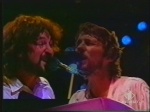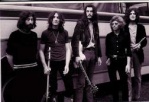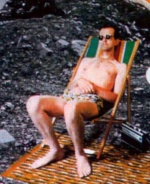Playlist
interview pete henderson
+2
Celtic1981
pumfret
6 participants
Page 1 sur 1

pumfret- Brother

- Messages : 198
Date d'inscription : 16/03/2010
Localisation : nice
 Re: interview pete henderson
Re: interview pete henderson
NTERVIEW - PETE HENDERSON
By ABEL FUENTES
Posted on THE LOGICAL WEB (www.thelogicalweb.com)
April 2011
QUESTION: When and where were you born in?
PETE: I was born in Hemel Hempstead, England, on January 1st 1955.
QUESTION: Did you study something related to sound engineering or music during your early years?
PETE: In those days there were no courses on recording. I played a little piano and guitar.
QUESTION: How did you start to work as a producer assistant in 1973?
PETE: After completing my A levels at age 18, I left school and wasn't sure what I wanted to do. Music was my big passion at the time. I read an article in "Melody Maker" about studio engineers and wrote to a couple of studios, AIR and Trident. I didn't hear back from either so went and knocked on their doors.
QUESTION: Why did you choose AIR, not Trident?
PETE: When I walked into AIR there was a board up saying which artists were recording and it read: Paul McCartney, Procul Harum and Roxy Music. I decided that this is where I wanted to work and kept returning every week to see if they had a vacancy. After a month they offered me a job.
QUESTION: Then you started to work with Geoff Emerick, isn't it?
PETE: Yes. I was lucky enough to exclusively assist Geoff for two years as well as learning from a lot of other great engineers like Bill Price, John Punter and Robin Cable. After that time I was promoted to engineer
QUESTION: Supertramp wanted Geoff Emerick to engineer "Even in the quietest moments", but at last you got the work… Why?
PETE: They asked Geoff but he was booked for another project and was kind enough to put my name forward.
QUESTION: Do you know why they wanted to replace Ken Scott when had gained a hi-fi quality sound reputation thanks to his work?
PETE: No, I don't know why they decided not to work with Ken again.
QUESTION: When and where did you meet the band for the first time?
PETE: I met the band for the first time in Santa Monica prior to flying to Caribou Ranch.
QUESTION: Considering that you were younger than the members of the band, did they see you as a beginner in a way?
PETE: I was a few years younger than the band but I had just recently worked with Paul McCartney on the album "Wings at the speed of sound", so I did have some experience.
QUESTION: In October 1976 you started to work with the band at the Caribou Studios in Colorado… What do you remember from the two months you lived and worked there?
PETE: Firstly the altitude. At around 8,000 feet, it was hard to do anything without running out of breath. I think it was hard to sing. But Caribou was a magical place.
QUESTION: Did Geoff Emerick help you with the final recordings and the mixing process of "Even in the quietest moments" at the Record Plant in Los Angeles?
PETE: When the recordings were completed I flew back to England and Geoff arrived to mix it.
QUESTION: In April 1978 you started to work with the band on the album "Breakfast in America" the day after getting married… What happened with your honeymoon?
PETE: I arrived on April 2nd, the day after getting married (divorced in 1984) to start work to find the band were not ready. They very kindly gave us a wedding present of a honeymoon in Hawaii and Maui. Upon return the album was rehearsed and demoed at Southcombe studios before commencing recording at The Village in June.
QUESTION: Why did you decide not to use string arrangements for "Breakfast in America", while the band had used them in their previous three albums?
PETE: There was a discussion towards the end of recording about adding strings and Sound FX, but the thought was that the record had a great band feel and that having a string section might take away from that. Also by this time, in 1978, synthesisers had advanced a bit so they were able to fill in some of the parts.
QUESTION: How meticulous were the recordings for the album "Breakfast in America"?
PETE: A kind of myth has grown up about the start of the recording sessions. For example, people claim we took three weeks to get the drum sounds. In reality about a week was taken to set up at The Village before rolling the tape. During this time, different drums and drum heads, three different grand pianos and a number of different microphones and set ups were brought in and tried. As none of us had used this studio before this turned out to be a very good decision though there was pressure to just "get on with it".
QUESTION: Is it true that you had over 40 different vocal tracks of several songs like "Goodbye stranger", and in some cases would take only one word from one track and mate it with another?
PETE: Most of the lead vocals were sung in two or three takes and then the best take was compiled. It was really all about capturing a performance. Often, if it wasn't right straight away we'd decide to return to it on another day, rather than sing it over. A lot of the vocals and harmonies were double tracked. The only occasion where a great number of tracks were used was on "Casual conversations" to emulate 10CC's "I'm not in love" ooohs. There may have been a whole 24 track tape with just vocals on it which were mixed down and dropped onto the song,
QUESTION: What percentages of the success for "Breakfast in America" would you assign to your production tasks and the music itself?
PETE: The songs are the most important element. The song selection was especially strong for "Breakfast in America". As mentioned elsewhere I don't think anyone ever tired of working on them despite hearing them thousands of times. I think we managed to capture an incredible energy and vibrancy with the backing tracks. Everything that was added after was merely to serve the songs, trying to bring out the best in them, helping them to reach their potential.
QUESTION: In February 1980 you won the Grammy to the best engineering for "Breakfast in America"… Did you think ever you would win this award during the nine months you were working on the album?
PETE: It never crossed anyone's mind. It was a total surprise when the envelope dropped through the door. No one in the band ever even said "I think this album is going to do well". The first really positive feedback was from Jerry Moss, the "M" in A&M Records, who commented after hearing early rough mixes that he thought it was going to be a huge success, which was nice to hear. I never tired of hearing the songs. The whole album seemed to have a very uplifting feel to it.
QUESTION: How many shows did you record during the "Breakfast in America" tour?
PETE: I believe about thirty shows were recorded in Canada and Europe.
QUESTION: Why did you decide to choose the recordings from Paris to release the live album?
PETE: The Paris shows were chosen because when we all listened back to the tapes they just seemed to have more magic to them. This may be down to a few factors… The Paris shows were at the end of the tour so maybe the performances had perfected over the tour… The recording process had been improved and fine tuned along the way… And maybe the Paris hall just had a better acoustic for their music.
QUESTION: Did you use to help Russel Pope any way during the live shows?
PETE: No, I never helped Russel with the live shows.
QUESTION: How did you record a show?
PETE: For the recordings we split the signal and I was in a recording truck parked outside the hall, recording the songs to 48 track tape.
QUESTION: What main differences did you find between working on "Even in the quietest moments" and "Breakfast in America"?
PETE: The first time working with any artist is always the hardest as you don't quite know what they want or expect. When they were making "Even in the quietest moments", they were still kind of off the radar as far as being to well known band. When it came to "Breakfast in America", every one had kind of hit their stride. There was a new confidence.
QUESTION: And between "Breakfast in America" and "Famous last words"?
PETE: For "Breakfast in America" the members of the band were very settled in Los Angeles. Everyone was totally focussed on making a great album. There was a very good upbeat atmosphere for the whole of the time. Mixing was the hardest part, knowing when we'd reached the finishing line. For "Famous last words" everyone was catching up on their private lives with young families having spent years flat out writing and touring.
QUESTION: Did you use the same equipment to record those three albums?
PETE: The studios were different for each album, though the equipment was fundamentally the same.
QUESTION: How were the recordings of "Famous last words"?
PETE: The dynamic was different for "Famous last words". Roger Hodgson and Rick Davies had both built studios. Roger's in Nevada City, Rick's in Encino. After the "Breakfast in America" album and tour, the band took extended time off and kind of settled into their respective lifestyles. Recording was split between Nevada City and Los Angeles, so there was a constant upheaval every week.
QUESTION: Were there many tensions inside the band by then due to the upcoming Roger`s departure?
PETE: The tensions were never brought into the studio and, despite all that has been said, relations between Roger and Rick were always good. They always had a great musical chemistry and when they played together there was always great empathy.
QUESTION: When and why did you stop working for Supertramp?
PETE: I stopped working with the band after "Famous last words". It seemed like an end to a chapter.
QUESTION: Didn't the band offer you to record "Brother where you bound", their first album after Roger left?
PETE: No. I'm sure when the band came to record "Brother where you bound" they felt they needed a fresh impetus.
QUESTION: What was your best moment working with Supertramp?
PETE: I couldn't really pick one moment as there are so many happy memories but the experience as a whole was such a positive one overall. I learned so much from each and every one of them as people.
QUESTION: What have you been working on since then?
PETE: I have worked on numerous sessions since the Supertramp days. All kinds of things from American folk bands: Three Merry Widows, The Raindogs, to working with Kevin Ayers, doing restoration work on an updated version of the "Anthology of American Folk Music" (to be released) to recording Russian artists, Time Machine and The Flowers. As well as conceiving a TV series for Irish TV, RTE.
QUESTION: Apart from Supertramp, you have worked for Paul McCartney, America, Robin Trower, Jeff Beck, Frank Zappa, Rush and many more… What of all those projects is your favourite one?
PETE: Can't really answer.
QUESTION: Some years ago you worked on Toontrack's Custom & Vintage virtual drum instrument with the drummer Chris Whitten… How did you get involved in that project?
PETE: I had previously worked with Chris Whitten for an extended period with Paul McCartney in the late 80's and early 90's. We both had a big interest in computer generated music and created a drum loop CD. When Toontrack released their first drum virtual instrument we were very impressed and contacted them with a view to working with them. They are a great company based in Sweden and are the current market leaders in virtual drums.
QUESTION: Where do you live now?
PETE: I live in London.
QUESTION: Are you still in touch with the members of Supertramp?
PETE: I saw Bob Siebenberg, John Helliwell and Dougie Thomson while listening through to material for the "Breakfast in America" deluxe. I last saw Roger when he played at Shepherd's Bush Empire a few years back. I am hoping to see him this year in May when he plays the Albert Hall in London. I couldn't go to the Supertramp show at the O2 Arena last year so missed seeing Rick.
QUESTION: How was your work on the deluxe edition of "Breakfast in America" released in October 2010?
PETE: The only work I did on the deluxe edition of "Breakfast in America" was to mix the extra live disc. This required quite a lot of organisation as a lot of the tapes from the thirty shows that were recorded had gone missing.
QUESTION: Had you worked before on any remastering of "Even in the quietest moments", "Breakfast in America" or "Famous last words" for CD?
PETE: No. Until the "Breakfast in America" deluxe, I hadn't been asked to oversee any of the remastering.
QUESTION: What do you know about the upcoming deluxe edition of "Crime of the century"?
PETE: The deluxe edition of "Crime of the century" is Ken Scott's domain, having produced and engineered that great album. I believe Ken has already mixed some tracks for the live show.
QUESTION: Do you know something about the release of the "Paris" DVD from 1979?
PETE: Watch this space...


Celtic1981- Dreamer

- Messages : 1138
Date d'inscription : 17/03/2010
Age : 43
Localisation : Angoulême
 Re: interview pete henderson
Re: interview pete henderson
Merci pour le lien et la traduction, mais j'ai pas compris la fin 
quelqu'un peut m'expliquer ?
A+

quelqu'un peut m'expliquer ?
A+

FAN 11- Dreamer

- Messages : 1423
Date d'inscription : 16/03/2010
Age : 58
Localisation : AUDE
 Re: interview pete henderson
Re: interview pete henderson
en allant sur le site espagnol j'ai compris....
A+
A+

FAN 11- Dreamer

- Messages : 1423
Date d'inscription : 16/03/2010
Age : 58
Localisation : AUDE
 Re: interview pete henderson
Re: interview pete henderson
PETE: I believe about thirty shows were recorded in Canada and Europe.
30 concerts ont été enregistrés ! Je doute énormément que seul les soirées de Paris aient été filmées.
> Croisons les doigts pour que que les sois-disant 5 chansons manquantes pour le DVD soient remplacées par ces 5 mêmes chansons tirées d'autres dates...
30 concerts ont été enregistrés ! Je doute énormément que seul les soirées de Paris aient été filmées.
> Croisons les doigts pour que que les sois-disant 5 chansons manquantes pour le DVD soient remplacées par ces 5 mêmes chansons tirées d'autres dates...

A Child of Vision- Friend in need

- Messages : 23
Date d'inscription : 04/10/2010
Age : 43
Localisation : Lille
 Re: interview pete henderson
Re: interview pete henderson
FAN 11 a écrit:en allant sur le site espagnol j'ai compris....
A+
moi aussi.


Celtic1981- Dreamer

- Messages : 1138
Date d'inscription : 17/03/2010
Age : 43
Localisation : Angoulême
 Re: interview pete henderson
Re: interview pete henderson
merci pour le lien pumfret 


phil86- Fool

- Messages : 975
Date d'inscription : 16/03/2010
Age : 60
Localisation : chatellerault
 Re: interview pete henderson
Re: interview pete henderson
Très intéressant, et pour moi le "watch this space" est un genre d'"affaire à suivre..." comme quoi c'est peut-être à l'ordre du jour... c'est juste qu'on ne sait pas encore quel jour ! 

Juggler Fumble- Potter

- Messages : 73
Date d'inscription : 09/11/2010
Age : 53
Localisation : Bordeaux
 Sujets similaires
Sujets similaires» Histoire du groupe (itv Pete Henderson)
» interview de BOB !
» interview de Jesse S. par Logicalweb
» interview de John
» interview de John !!!!!
» interview de BOB !
» interview de Jesse S. par Logicalweb
» interview de John
» interview de John !!!!!
Page 1 sur 1
Permission de ce forum:
Vous ne pouvez pas répondre aux sujets dans ce forum|
|
|




